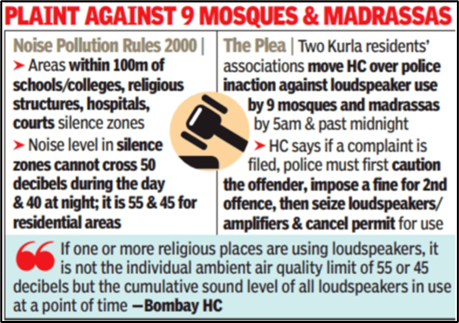Why in news?
Observing that the use of loudspeakers is not an essential part of any religion, Bombay high court directed the state to curb noise pollution by places of worship, irrespective of religion.
What’s in today’s article?
- Essential Religious Practices Doctrine
- Bombay HC on Loudspeaker Use: Key Directives
Essential Religious Practices (ERP) Doctrine
- It governs which religious practices are protected under Arts. 25 & 26 of the Constitution.
- Overview
- The doctrine is a legal framework created by the Supreme Court to balance the competing interests of freedom of religion and the state's ability to regulate practices.
- It protects only those religious practices that are deemed essential to a particular religion.
- Key Features
- Freedom of Religion: The doctrine protects practices that are essential to a religion, under the freedom of religion provisions in the Indian Constitution.
- State's Role in Social Reforms: The doctrine allows the state to implement social reforms without infringing on essential religious practices.
- Bifurcation of Practices: It distinguishes between essential and non-essential religious practices, offering protection only to those considered essential.
- Historical Context
- First Articulation: The doctrine was first articulated in the 1954 case The Commissioner Hindu Religious Endowments, Madras v. Sri Lakshmindra Thirtha Swamiar of Sri Shirur Mutt.
- Criticism: The application of the doctrine has been criticized for being inconsistent and incoherent.
- Notable Examples
- The Durgah Committee, Ajmer v. Syed Hussain Ali (1961): The court ruled that only practices that are essential and integral to a religion are protected.
- Ismail Faruqui v. Union of India (1994): The court ruled that a mosque is not an essential practice for the religion of Islam.
Bombay HC on Loudspeaker Use
- In a significant ruling, the Bombay High Court has declared that the use of loudspeakers is not an essential practice of any religion.

- Court Observations
- Loudspeaker use is not an essential part of any religion and is not protected under Article 25 (freedom of religion).
- Noise pollution is a public health hazard and should be strictly controlled to safeguard citizens' rights.
- Law enforcement must ensure compliance with noise regulations and avoid being passive in such cases.
- Case Background
- Residents of Nehru Nagar, Kurla East, filed a plea citing noise pollution by religious places beyond permissible decibel limits and hours.
- Permissible limits: 55 decibels (daytime) and 45 decibels (nighttime) in residential areas.
- Complaints to local police stations were ignored, leading to the petition in the Bombay High Court.
- Key Directives
- Police must measure decibel levels using mobile applications and seize equipment violating noise norms.
- Initial violations should result in warnings; repeated offenses may lead to fines, equipment seizure, and license cancellation.
- Police must ensure complainant anonymity to prevent retaliation.










